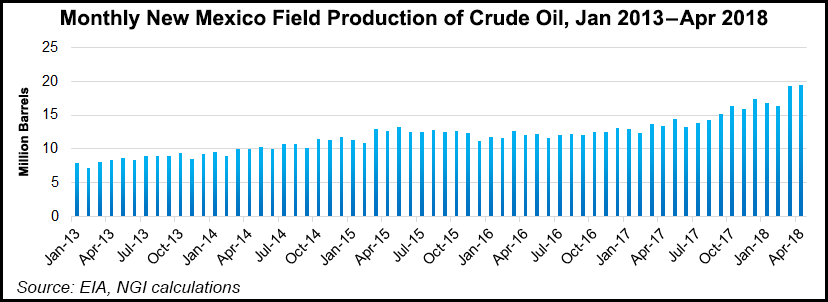E&P | NGI All News Access | Permian Basin
New Mexico Oil, Gas Lease Revenues Set Record
The New Mexico State Land Office (SLO), on pace to establish record revenues from oil and gas sales in the Permian Basin, set a record with $4.9 million in a June oil and gas lease sale that pulled in $106.9 million for fiscal year (FY) 2018.

The previous record set in FY2012 was $102 million.
“We have generated more money than ever for our beneficiaries in 2018 with fewer acres sold at an average price of $1,057/acre,” said State Land Commissioner Aubrey Dunn.
In FY2018, 74,908 acres were sold at an average cost of $1,429/acre, Dunn told NGI’s Shale Daily on Friday. SLO, which manages nearly two million acres, collects lease sale earnings monthly.
The state in the June sale offered 32 tracts covering more than 8,179 acres in Lea and Roosevelt counties. Total high bids topped $4.9 million by eight bidders. The average price was just shy of $600/acre. A total of 25 bidders from five states participated in the June 18 sale.
The top bidder in the sealed bids for June was Artesia, NM-based Chase Oil, which acquired two 320-acre tracts at $2,209/acre. Chase also submitted the highest bid in the open format, leasing 320 acres at $506.56/acre.
A combination of education, university and water resource recipients receive proportional shares of the revenues. Lease sale earnings are paid into the Land Maintenance Fund. “The agency is entirely self-funded and spends about three cents of every dollar earned,” Dunn said, noting that the rest of the revenue is distributed directly to the beneficiary organizations.
Calling oil and gas an “integral part’ of the SLO, Dunn said the state’s industry is robust.
“We have laid the groundwork for future generations to benefit from this agency’s efforts on their behalf,” Dunn said
Earlier this year, he reiterated the importance of the Permian boom and touted New Mexico as a global “hotspot” for oil production. New Mexico has leapfrogged California and Alaska to become the third leading state for oil production behind No. 1 Texas and No. 2 North Dakota.
Meanwhile, the SLO last month was drawn into a growing water controversy sparked by the increased drilling in the Permian. Dunn on June 21 filed a petition in district court seeking to prevent the New Mexico State Engineer from issuing alleged unlawful temporary water well permits that change well designations to industrial use from livestock.
Rather than follow a statewide limit of three-acre-feet/well, the State Engineer has allowed up to nine-acre-feet/well, and Dunn said it could undermine the value of state trust lands in the Permian. The filing alleges that since 2010 about 415 million gallons of water have been unlawfully appropriated.
Dunn has noted that Texas water is being transported across some of New Mexico’s trust lands for hydraulic fracturing operations.
© 2024 Natural Gas Intelligence. All rights reserved.
ISSN © 2577-9877 | ISSN © 2158-8023 |
